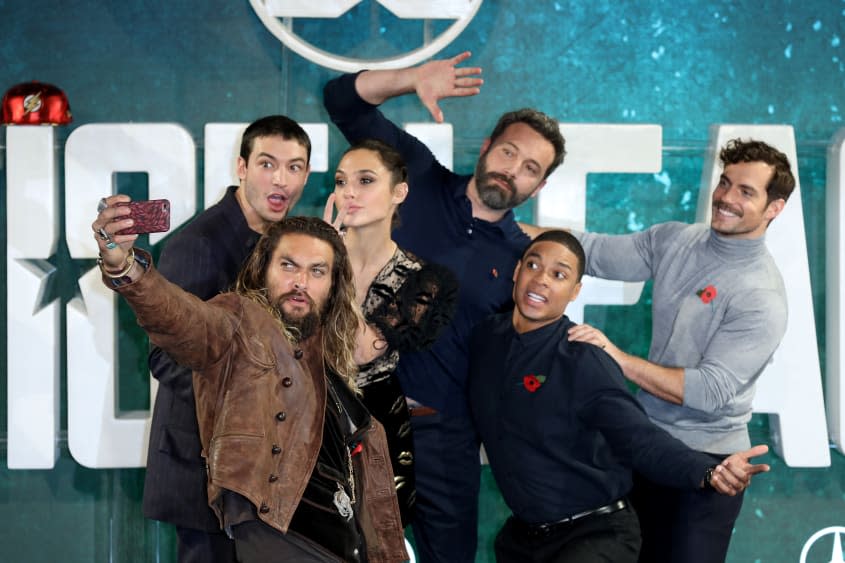The rise and fall of the DC Extended Universe

- Oops!Something went wrong.Please try again later.
- Oops!Something went wrong.Please try again later.
- Oops!Something went wrong.Please try again later.
The end of one of Hollywood's most high-profile failed franchises is in sight.
"Blue Beetle," which hits theaters Friday, represents one of the dying gasps of the zombie franchise known as the DC Extended Universe. So how did this interconnected world of superheroes come crashing down, and what lessons can Hollywood learn?
Origin story
In 2012, Marvel changed Hollywood forever with the success of "The Avengers." The studio's risky plan to give several superheroes standalone movies that slowly led into a crossover event paid off, producing one of the biggest blockbusters in history.
But at that point, Marvel's main comic book competitor, DC, was nowhere close to having its own version of "The Avengers" on the big screen. That year, Christopher Nolan concluded his "Dark Knight" trilogy, a series of Batman films that stood on their own. But DC had a Superman reboot from Zack Snyder, "Man of Steel," on the way, and it was announced that the movie could lead to more films in the same universe. Snyder's dark take was divisive, and "Man of Steel" received mixed reviews, but its box office performance was solid. So DC moved ahead with a cinematic universe, and a slate of 10 films was unveiled by 2014, including a "Man of Steel" follow-up and a two-part "Justice League" movie directed by Snyder.
Though Marvel released five films before its first major crossover event, the DC Extended Universe jumped into a team-up movie with its second installment: "Batman v Superman: Dawn of Justice." Snyder's 2016 film was tasked with not only being a "Man of Steel" sequel but setting up DC's equivalent of the Avengers, the Justice League, introducing Batman and Wonder Woman while teasing Aquaman, Cyborg, and the Flash. Snyder also had to make time to kill off Superman, setting up his future resurrection. The result, critics argued, was a mess, and reviews were disastrous. The consensus was that DC erred by rushing into its new universe and stuffing so much into a single movie. After a huge $166 million debut, the film collapsed in its second weekend.
The Hollywood Reporter soon revealed a shake-up was underway, as Warner Bros. was giving oversight of the franchise to executives Jon Berg and Geoff Johns in an attempted course correction. The Wall Street Journal also reported the studio had reworked Synder's "Justice League" to make it "less grim and depressing" than "Batman v Superman."
Fall of justice
DC's next film was "Suicide Squad," another critical catastrophe that director David Ayer later said was forced to undergo reshoots written by Johns because the studio "panicked" over the negative reception of "Batman v Superman." But things were looking up in 2017 with "Wonder Woman," which critics and audiences both loved.
That fall, the moment of truth came for DC with "Justice League," the crossover event where its heroes join forces à la "The Avengers." But after Snyder stepped away from post-production due to a family tragedy, "Avengers" director Joss Whedon substantially reshot the film, emphasizing a lighter tone. Once again, this didn't help, as "Justice League" bombed, and Snyder's plans to continue his universe died.
This led to another shake-up, as Walter Hamada was tapped to oversee DC's films, replacing Berg and Johns. Even before "Justice League," Vulture reported DC planned to de-emphasize connections between movies, and this played out in the following years. So the next DC films, "Aquaman," "Shazam!," "Birds of Prey," "Wonder Woman 1984," and "The Suicide Squad," were largely standalone. DC even started releasing movies not set in the DCEU, such as "Joker" and "The Batman." Critics generally felt the quality improved during this period, but the box office grosses were inconsistent. Marvel had trained audiences to see nearly every one of its films because they connect and build toward crossover events, but DC hadn't engendered that kind of brand loyalty.
In 2022, DC faced another shake-up after Warner Bros. and Discovery merged, and new CEO David Zaslav promised "a reset," tapping James Gunn and Peter Safran to oversee the newly-created DC Studios. By February 2023, Gunn laid out his vision for the "first chapter" of the "DC Universe," confirming the DC Extended Universe was dead. Gunn pledged to ensure this new universe's projects are connected, a break from DC's prior strategy. But there were still several DCEU films to be released, including "The Flash," which called back to "Man of Steel" — and became a massive box office bomb. The DCEU, it seemed, would end with a whimper, and "Blue Beetle" and "Aquaman and the Lost Kingdom" are its final entries.
Ultimately, the DC Extended Universe may be remembered as a cautionary tale of what happens when a studio rushes into a cinematic universe too quickly, suggesting that when it comes to crafting a successful franchise, slow and steady wins the race.

